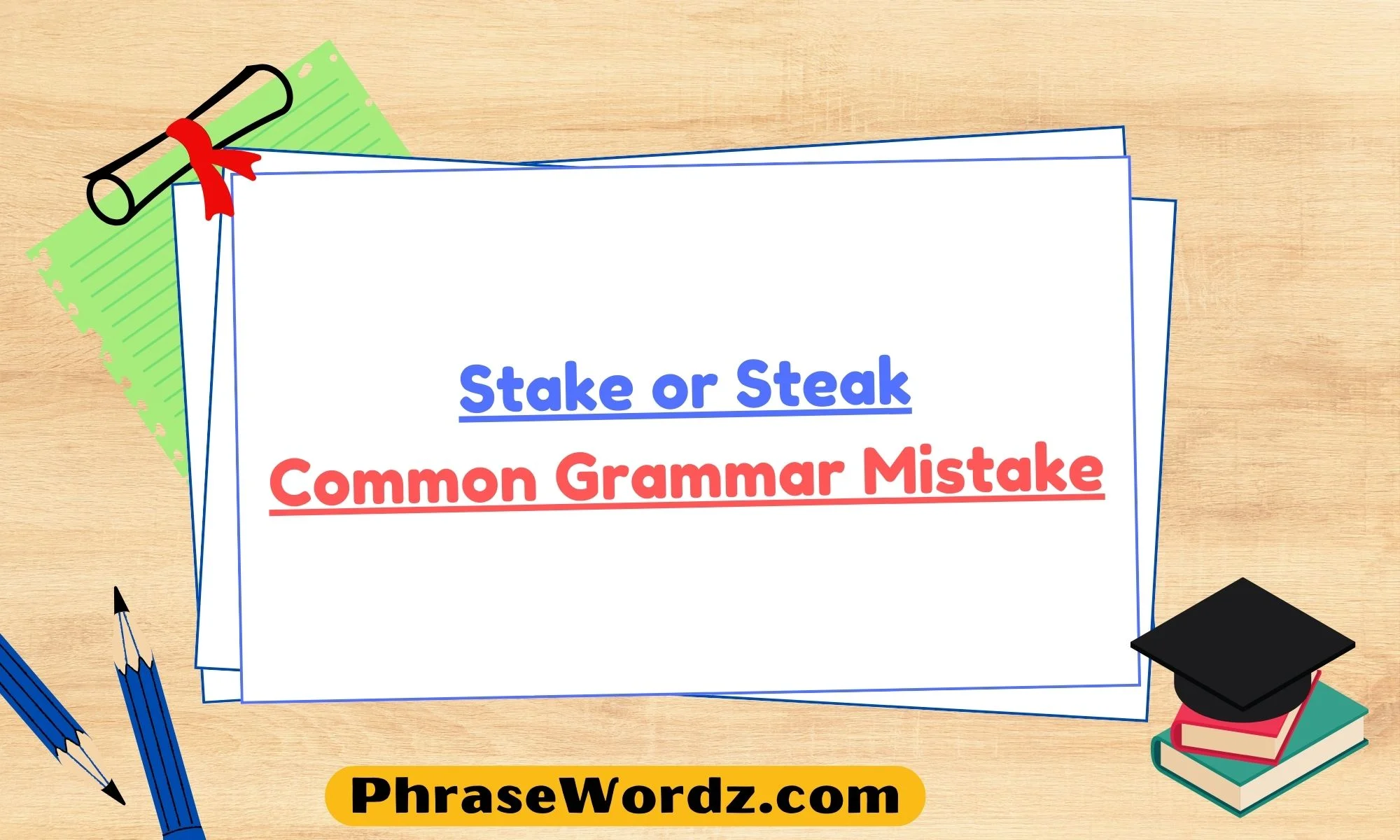English can be tricky, especially when it comes to homophones—words that sound the same but have different meanings and spellings. One common confusion arises between “stake” and “steak.”
Confused about Stake or Steak? While they sound the same, they have very different meanings. Learn how to use these words correctly in business, risk, and dining contexts with our detailed guide.
While they sound identical, their meanings, contexts, and even usage in phrases vary significantly. In this article, we’ll explore the nuances between these two words, their correct applications, and provide engaging examples, scenarios, and email samples to illustrate their usage.
What Does “Stake” Mean?
The word “stake” has several meanings depending on the context, primarily relating to:
- A sharp object driven into the ground: Often used in construction, agriculture, or even fictional stories (e.g., vampire hunting).
- A financial interest or share: Commonly seen in business and investments.
- Risk or something at risk: Often used metaphorically to refer to what one could lose in a situation.
- Claim or declare ownership: To “stake a claim” means to assert one’s right to something.
Example Sentences Using “Stake”
- The farmer drove a stake into the ground to mark the boundary of his land.
- Investors held a significant stake in the company’s growth strategy.
- There’s a lot at stake in this competition, so everyone is giving their best effort.
- Sarah decided to stake her claim on the last slice of cake at the party.
Scenario Example: Business Context
Email Example:
Subject: Clarification on Equity Stake
Dear Julia,
I hope this email finds you well. As discussed in our previous meeting, I wanted to clarify my position regarding the stake I hold in the project. With my 15% equity stake, I aim to actively contribute to the strategic direction and ensure the company achieves its growth objectives.
If there’s any documentation I need to review or sign, please let me know. I’m happy to arrange a call to discuss this further.
Best regards,
Michael
What Does “Steak” Mean?
The word “steak” refers to a slice of meat, typically beef, that is grilled, broiled, or cooked in various ways. It’s almost always associated with food and dining. There are also vegetarian and plant-based steaks, but the term generally conjures images of juicy, sizzling meat on a plate.
Example Sentences Using “Steak”
- I ordered a medium-rare steak at the restaurant last night.
- Grilled steaks are often the highlight of summer barbecues.
- Lisa cooked a delicious tofu steak for her vegetarian guests.
- The chef’s special includes a sirloin steak with garlic butter sauce.
Scenario Example: Dining Context
Email Example:
Subject: Reservation Confirmation
Dear Mr. Anderson,
We are pleased to confirm your dinner reservation at The Prime Cut Restaurant on December 20th at 7:30 PM. Our menu features a variety of options, including our signature ribeye steak, prepared to perfection by our award-winning chef.
Should you have any specific dietary preferences or requests, please let us know in advance. We look forward to serving you.
Warm regards,
Sophia
Customer Relations Manager
Common Phrases and Idioms Featuring “Stake” and “Steak”
Phrases with “Stake”
- At stake: Refers to something that is at risk.
- Example: “With so much at stake, we can’t afford any mistakes.”
- Stake your claim: To assert ownership or declare something as yours.
- Example: “The explorers rushed to stake their claims on the newly discovered land.”
- High stakes: Indicates a situation with significant risks or rewards.
- Example: “The poker game was intense because of the high stakes involved.”
Phrases with “Steak”
- A big steak dinner: Often refers to a celebratory or rewarding meal.
- Example: “If we win the deal, dinner’s on me—a nice steak dinner!”
- As tough as shoe leather: Describes an overcooked steak.
- Example: “I asked for medium-rare, but my steak turned out as tough as shoe leather.”
- A rare steak: A lightly cooked steak, often used metaphorically to describe something unusual or precious.
- Example: “Finding such a talented artist in a small town is like finding a rare steak!”
Tips to Avoid Confusion Between “Stake” and “Steak”
- Remember the Context:
- If you’re talking about food, it’s always “steak.”
- If you’re referring to risk, ownership, or a sharp object, it’s “stake.”
- Visual Association:
- Think of a sizzling steak on a plate versus a stake in the ground or metaphorical stakes in a game.
- Use Mnemonics:
- Stake = Standard (used in business or practical contexts).
- Steak = Steaming meat.
Fun Facts About “Stake” and “Steak”
- Historical Origin:
- The word “stake” comes from Old English “staca,” meaning a post or support.
- “Steak” comes from Old Norse “steik,” meaning meat roasted on a stick.
- Pronunciation Pitfall:
- Both words are pronounced the same way, making it easy to confuse them, especially in spoken English.
- Cultural Significance:
- Steak dinners are often seen as a symbol of luxury or celebration in many cultures, while stakes signify risk and reward, particularly in gambling or business.
Describe the Difference Between Stake or Steak
| Feature | Stake | Steak |
|---|---|---|
| Meaning | A sharp object, risk, or financial share. | A slice of meat (or vegetarian equivalent). |
| Usage | Used in business, agriculture, and idiomatic expressions. | Primarily used in culinary and dining contexts. |
| Common Phrases | At stake, stake your claim, high stakes. | A rare steak, as tough as shoe leather. |
| Example Sentence | “The farmer drove a stake into the ground.” | “She enjoyed a juicy steak for dinner.” |
| Context | Risk, finance, or practical tools. | Food or dining scenarios. |
| Origin | Old English “staca” (post or support). | Old Norse “steik” (meat roasted on a stick). |
Conclusion
The confusion between “stake” and “steak” arises due to their identical pronunciation but vastly different meanings. By understanding their definitions, usage, and context, you can confidently use these words without errors. Remember, if you’re risking something or talking about ownership, it’s “stake,” but if it’s about food, it’s always “steak.”
Taking time to learn the subtle differences in English homophones can significantly enhance your writing and speaking skills.











